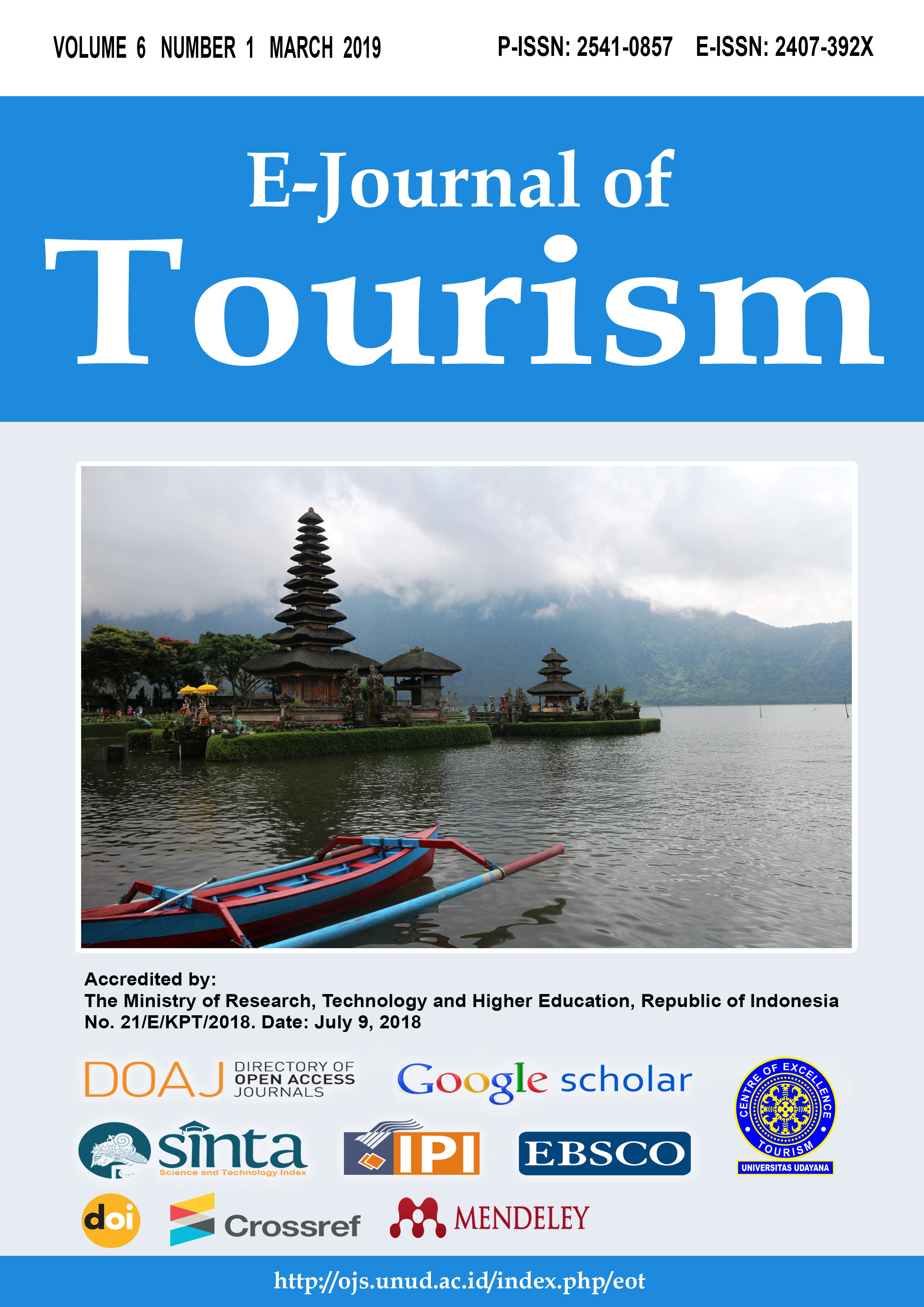The Role of Local Government in Fostering the Economic of Community:
A Lesson from Tourism Development at Nusa Penida Islands of Bali
Abstract
For Bali and its administrative territories, tourism and the related sectors are very important for their development agendas. Referring to Bali Statistic Office, the agricultural sector and food and beverages services, contribute more than one-third of Bali’s gross regional domestic product (PDRB) for the year 2017. It is not surprising, then, tourism and the related industries have been positioned as the important pillars for the economic development of Bali. Consisting of nine regencies or city, Klungkung, after Denpasar city as the capital of Bali, is the second smallest region with its area is 315 km square or approximately 5.59 percent of Bali area as much as 5,366.66 km square. In the last five years, the local government of Klungkung is intensively developing Nusa Penida district as a marine tourists destination. The aim of this essay is to study the causal relationship between government roles and the economic benefit of tourism for the local people. A hundred and thirteen people of Nusa Penida were questioning their perception regarding the benefits of tourism for their families. Applying variance-based SEM, this work found the roles did not directly affect the economy of local people. However, by the mediation of tourists' behavior as well as the tourism industries at Nusa Penida, the role of Klungkung’s government is significantly influence the economy of Nusa Penida people.
Downloads
References
BPS (2018) Kabupaten Klungkung Dalam Angka 2018. Semarapura: BPS Kabupaten Klungkung.
BPS Provinsi Bali (2018) Provinsi Bali Dalam Angka 2018. Denpasar: BPS Provinsi Bali.
Chiang, C. and Huang, K. (2012) ‘An Examination of Antecedent Factors in Residents’ Perceptions of Tourism Im-pacts on a Recreational Fishing Port, Asia Pacific Journal of Tourism Research, 17(1), pp. 1–20. doi: 10.1080/10941665. 2011.613204.
Dijkstra, T. K. and Henseler, J. (2015) ‘Consistent Partial Least Squares Path Modeling’, MIS Quarterly, 39(2), pp. 297–316. doi: 10.25300/MISQ/2015/39.2. 02.
Dijkstra, T. K., Ringle, C. M. and Henseler, J. (2015) ‘Consistent and asymptotically normal PLS estimators for linear structural equations’, Computational Statistics & Data Analysis, 43, pp. 115–135. doi: 10.1007/s11747-014-0403-8.
Hair, J. F. et al. (2014) A Primer on Partial Least Squares Structural Equation Modeling (PLS-SEM). London, UK: SAGE Publications, Inc.
Henseler, J., Hubona, G. and Ray, P. A. (2016) ‘Using PLS path modeling in new technology research: updated guidelines’, Industrial Management & Data Systems, 116(1), pp. 2–20. doi: 10.1108/IMDS-09-2015-0382.
Kencana, E. N. (2016) ‘Participation of Balinese Toward Tourism Can Govern-ment and Tourism Industries Affect Participation ?’, in International Tourism Conference: Promoting Cultural and Heritage Tourism. Bali: Udayana University and SORBONNE University, pp. 1–3.
Kencana, E. N. (2017) ‘Participation of Balinese Toward Tourism and Its Impacts : Case Study at Kuta and Nusa Dua Areas of Bali, Indonesia’, in Interna¬-tional Statistic Conference. Denpasar: International Statistical Institute, pp.1–12.
Kencana, E. N. and Manutami, T. (2017) ‘Structural Model to Evaluate the Effect of Community Participation on Ecotou-rism Sustainability’, Journal of Physics: Conf. Series, (012030), pp. 1–6. doi: 10.13140/RG.2.1.4527.7525.
Leksakundilok, A. (2004) Ecotourism and Community-based Ecotourism in the Mekong Region. 10. Sydney.
Mansuri, G. and Rao, V. (2004) ‘Community-based and -driven development: A critical review’, World Bank Research Observer, 19(1), pp. 1–39. doi: 10.1093/wbro/ lkh012.
Okazaki, E. (2008) ‘A community-based tourism model: Its conception and use’, Journal of Sustainable Tourism, 16(5), pp. 511–529. doi: 10.1080/096695808021 59594.
Park, S. Y. (2009) ‘An analysis of the technology acceptance model in understanding university students’ behavioral intention to use e-learning’, Journal of Educational Technology & Society, 12(3), pp. 150–162. doi: 10.1007/ s00340-009-3513-0.
Peng, D. X. and Lai, F. (2012) ‘Using partial least squares in operations management research: A practical guideline and summary of past research’, Journal of Operations Management. Elsevier B.V., 30(6), pp. 467–480. doi: 10.1016/j.jom. 2012.06.002.
Ringle, C. M., Wende, S. and Will, A. (2017) ‘SmartPLS 3.2’.
Sanchez, J. (2009) Local participation as a tool for tourism development in La Guajira, Colombia, MA European Tourism Management. Universidad Rey Juan Carlos, Madrid.
Tosun, C. (2002) ‘Host perceptions of impacts: A comparative tourism study’, Annals of Tourism Research, 29(1), pp. 231–253. doi: 10.1016/S0160-7383(01) 00039-1.

This work is licensed under a Creative Commons Attribution 4.0 International License.
The copyright of the received article shall be assigned to the journal as the publisher of the journal. The intended copyright includes the right to publish the article in various forms (including reprints). The journal maintains the publishing rights to the published articles.




















